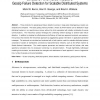140
click to vote
VEE
2012
ACM
13 years 9 months ago
2012
ACM
This paper describes the design and implementation of SecondSite, a cloud-based service for disaster tolerance. SecondSite extends the Remus virtualization-based high availability...
116
click to vote
CLUSTER
1999
IEEE
15 years 1 months ago
1999
IEEE
Three protocols for gossip-based failure detection services in large-scale heterogeneous clusters are analyzed and compared. The basic gossip protocol provides a means by which fai...
144
click to vote
CACM
1999
15 years 1 months ago
1999
stractions underlying distributed computing. We attempted to keep our preaims at an abstract and general level. In this column, we make those claims more concrete. More precisely, ...
124
click to vote
SOQUA
2007
15 years 3 months ago
2007
Failure detection is a difficult and often expensive task. The principle of self-healing addresses this cost issue, but poses new research questions. This work focuses on detectin...
164
click to vote
DSN
2004
IEEE
15 years 5 months ago
2004
IEEE
The growing interest in ad hoc wireless network applications that are made of large and dense populations of lightweight system resources calls for scalable approaches to fault to...
112
click to vote
WETICE
1999
IEEE
15 years 6 months ago
1999
IEEE
The rapid growth of the Web has made it possible to build collaborative applications on an unprecedented scale. However, the request-reply interaction model of HTTP limits the rang...
DSN
2003
IEEE
15 years 7 months ago
2003
IEEE
Fault-tolerant distributed systems based on fieldbuses may benefit to a great extent from the availabilityof semantically rich communication services,such as those provided by g...
129
click to vote
KDD
2005
ACM
15 years 7 months ago
2005
ACM
The increasing complexity of today’s systems makes fast and accurate failure detection essential for their use in mission-critical applications. Various monitoring methods provi...
121
click to vote
SSS
2007
Springer
15 years 8 months ago
2007
Springer
We present a modular redesign of TrustedPals, a smartcard-based security framework for solving secure multiparty computation (SMC)[?]. TrustedPals allows to reduce SMC to the probl...
119
click to vote
GPC
2007
Springer
15 years 8 months ago
2007
Springer
We present in this paper the recent developments done in P2P-MPI, a grid middleware, concerning the fault management, which covers fault-tolerance for applications and fault detect...


